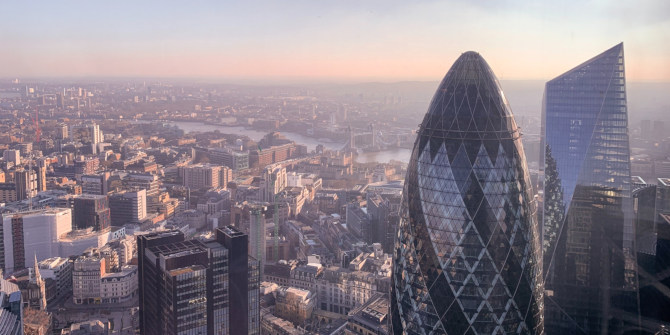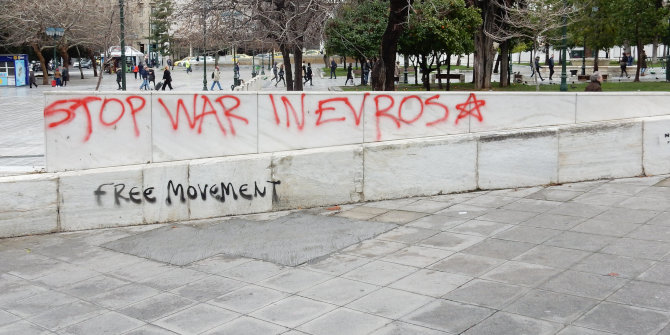 A number of commemorative events are planned for later this year to mark the seventieth anniversary of the end of the Second World War. Marco Siddi writes that while the EU and Russia have both participated in previous commemorations, the Ukraine crisis has made joint events unlikely to take place in 2015. He argues that both sides should avoid linking the occasion to Ukraine as they have little to gain from political disputes spilling over into the field of history.
A number of commemorative events are planned for later this year to mark the seventieth anniversary of the end of the Second World War. Marco Siddi writes that while the EU and Russia have both participated in previous commemorations, the Ukraine crisis has made joint events unlikely to take place in 2015. He argues that both sides should avoid linking the occasion to Ukraine as they have little to gain from political disputes spilling over into the field of history.
As the seventieth anniversary of the end of the Second World War approaches, the statements and actions of Russian leaders and several of their EU counterparts are showing that the Ukraine crisis has reached into the realm of European historical memory. Large celebrations are expected in Moscow on 9 May, notably the traditional military parade where the Russian government shows off some of its most modern military hardware. However, contrary to previous years, very few Western leaders will attend the celebrations.
Russian commemorative events to mark the Second World War have previously caused some controversy in the past. The leaders of post-communist Poland and the Baltic States have long been reluctant to commemorate a date which, for them, marks the beginning of 45 years of Soviet domination. However, Western leaders usually attended the Moscow military parade without much prior deliberation.
A snapshot of the 2005 celebrations for the sixtieth anniversary of the end of the war shows then German chancellor Gerhard Schroeder, French President Jacques Chirac and his US counterpart George W. Bush sitting in the first row next to Vladimir Putin. The fact that, so far, Czech president Miloš Zeman is the only EU leader who has confirmed attendance at the upcoming 9 May parade in Moscow highlights the current rift between Russia and Western countries.
Russia, Ukraine and the collective memory of WWII
The decision of EU and US leaders not to travel to Moscow can be understood within the broader geopolitical context, whereRussia and the West are at loggerheads over Ukraine and sanctions. However, the conflict in Ukraine conceals the deeper roots of the historical controversy. Russia and several EU countries have failed to reconcile their official narratives about the history of the twentieth century. This has allowed the spill-over of the Ukraine crisis into the collective memory of the Second World War.

On the one hand, post-Soviet Russia has built a founding myth around victory in the ‘Great Patriotic War’ (as Russians call the Soviet Union’s war against Nazi Germany in 1941-1945) despite the immense human cost which the USSR had to pay in the conflict. This glorifying narrative focuses mostly on the Russian – as opposed to the all-Soviet – contribution to the war effort, in a dichotomy that sets the good Russians against the fascists. In this dichotomy there is hardly any room for other actors and nationalities: East Central Europe is depicted mostly as a beneficiary of Russian liberation from Fascism.
Furthermore, the term ‘fascist’ is extracted from this narrative and used in current politics, outside of its historical context, to describe perceived enemies of the Russian state. Through this artifice, the post-Maidan Ukrainian government has been described as a ‘fascist junta’ and thereby juxtaposed with Russia’s historical enemies. By contrast, European far-right politicians do not necessarily fall in the category of ‘fascist enemies’, particularly if they support current Russian domestic and foreign policy. This is exemplified by the fact that last March the pro-Kremlin party Rodina organised a meeting of neo-fascist European parties in Saint Petersburg – incidentally, a city that many in Russia (and beyond) consider heroic for having resisted a 900-day Nazi siege.
On the other hand, the leaders of some EU member states have also contributed to the politicisation of the memory of the Second World War. In January 2015, on the occasion of the seventieth anniversary of the liberation of the Auschwitz concentration camp, Poland unleashed a diplomatic row with Russia by failing to invite Russian leaders to the commemorations. The incident was particularly awkward because the camp was liberated by Soviet troops and a large share of its victims were citizens of the Soviet Union, of which Russia is the largest successor state.
Polish foreign minister Grzegorz Schetyna fuelled the dispute by arguing that Ukrainians, rather than the Red Army, should be credited for the liberation of Auschwitz. Schetyna’s misleading claim was based on the observation that an army group called First Ukrainian Front had liberated the camp; in fact, this was a multinational Soviet army group, including Ukrainians among many others. Worryingly, the Polish foreign minister appeared keen to use a Holocaust commemoration as an opportunity to take sides in the current Russian-Ukrainian conflict.
Schetyna’s comments reflect the widespread reluctance in post-communist East Central Europe to acknowledge the role of the Soviet Union in defeating Nazism. This stance is due to the fact that the advance of the Red Army in Eastern Europe also caused much civilian suffering and was followed by the imposition of Soviet-style regimes.
After 45 years of Soviet control, East Central European countries are finally free to commemorate their suffering at the hands of the Red Army; museums of Soviet occupation and communist terror have duly been opened throughout the region. However, the current and dominant narratives about national suffering tend to leave little room for competing discourses that adopt a critical angle or take into account the perspective of minority groups (notably those of Russian minorities in the Baltic countries).
Within this context, the abuse of historical memory in the Ukraine crisis has contributed to the clash between dominant narratives about the Second World War in Russia and some EU member states. However, both sides have little to gain from extending the confrontation to the field of history. Europe would benefit from sharing an inclusive narrative of its twentieth century history. Such a narrative should highlight the devastating and genocidal effects of war and focus on the responsibility of authoritarian states – most notably fascist regimes – for the outbreak of the conflict.
It should emphasise both the key role of the Soviet Union in the Allied war effort and the suffering caused by the Stalinist regime through its conduct of war and the subsequent subjugation of East Central Europe. Although agreeing on a shared historical narrative seems an unlikely prospect at this stage, European leaders should strive for it at the numerous upcoming commemorations of the Second World War, as it could also be a first step towards reconciling views about present conflicts.
Please read our comments policy before commenting.
Note: This article gives the views of the author, and not the position of EUROPP – European Politics and Policy, nor of the London School of Economics.
Shortened URL for this post: http://bit.ly/1Hk6eCc
_________________________________
 Marco Siddi – Finnish Institute of International Affairs
Marco Siddi – Finnish Institute of International Affairs
Marco Siddi is Senior Research Fellow at the Finnish Institute of International Affairs, where he focuses on EU-Russia relations. He was awarded a PhD in Politics at the University of Edinburgh.




